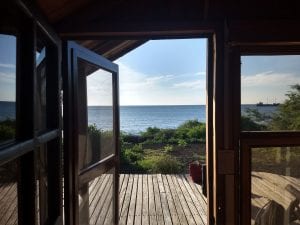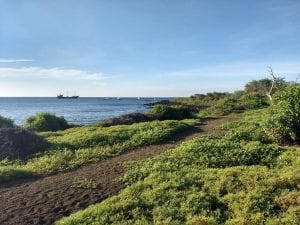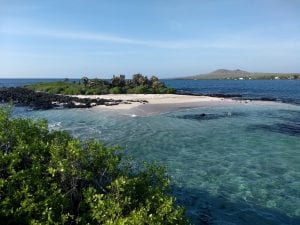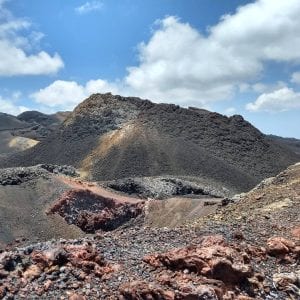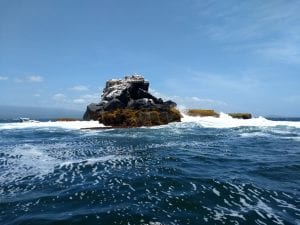Pshhhh, I’m not like those other tourists—those walking, shorts-and-sandals-wearing beneficiaries of globalization. I say “buenas” or “buenas tardes” when I walk by people on the street. I don’t automatically assume that everyone who passes by me speaks English. And I’m not one of those “gringos fríos,” unless your “frío” actually means to imply “cool.” I pick conversations with shop owners. I go to smaller museums to really learn about the pormenores (details) of the culture. I’ve spent hours thumbing through newspapers to understand what’s really going on. I read a good amount of texts about the politics and culture of the country from native authors. I ride public transportation every day. I live with a host national family and do chores. I’m a regular at the local family-run café. I say “chutaaaa” when things go horribly wrong. I am aware of how my presence and identity take up certain kinds of space. Right… right?
It is a warm, sunny day on the island of Isabela in the Galapagos, and I am watching a group of English-speaking tourists fumble around for their booking information—yet also still proceeding through the sand-covered streets with an air of entitlement. One says “hello” to me. I respond with “hola,” barely hiding my disdain. For weeks, the students on my program and I have been reflecting on the socio-political and linguistic costs of tourism and globalization, and now that we have come face-to-face with the beast itself, it is difficult for us to put away any critical lens. As we walk around the small town of Puerto Villamil, every few steps punctuated by a fallen coconut, and as we observe the developing skeletons of new hotels and restaurants and hear their noisy growth, I try to visualize what it looked like more than thirty years ago before the uptick in tourism. I try to reflect on the types of cultural changes that may have occurred. And I also attempt to imagine what it all could have looked like before there was any human presence on the island at all.
But while this all goes on in my mind, I neglect to think on how one could easily look at me and feel the same kind of contempt. After all, did I not just hike through the national park earlier that day, and do some snorkeling in the nearby bay? Am I not currently returning to my cushy beachside hotel room with a balcony overlooking the shore? Am I not going to a restaurant later this evening to feast on an assortment of seafood delights? No matter how many “buenas tardes” I might let loose, there is no way that I can separate myself from the truth: I am also part of the problem.
Early on during program orientation, our academic director made us sit with a rather destabilizing idea: that study abroad is just another form of neocolonialism. It is hard, at least for me after significant reflection, to think otherwise. Students purchase their experiences abroad through the help of certain programs, where they will then spend their time enjoying what the countries have to offer and extracting cultural knowledge—often without the consent of their populations nor with much reciprocity. And, usually arriving with sizeable spending money, these individuals enter a socio-cultural landscape with privileges which subsequently affect the communities hosting them; i.e. a community moving away from traditional practices to produce touristic goods and experiences. Often, the arrow of power seems to point in only one direction.
I have been very fortunate to be in an academic program that takes structural inequalities into consideration and attempts to minimize its impacts on native populations, prioritizing local businesses and attempting to create relationships of reciprocity. But its role—and by extension my role—within the industry of academic tourism cannot be completely exonerated. We still take part in global processes that to a certain extent exploit certain populations for the benefit of others. We still take part in imposing the hegemony (the somewhat hackneyed political word for domination) of the market.
How, then, do you avoid being like the “other tourists”? I do not think you ever can completely. But to start, saying “buenas,” as already mentioned, is not enough. It is about putting aside your cultural assumptions and entering in dialogue with host nationals, learning new things and also sharing your own knowledge. It is about being attentive to the power dynamics between you and other persons, as well as recognizing your role as an actor in processes bigger than yourself—and then taking concrete steps to avoid or counter the damage. It is about looking to create relationships of reciprocity and consent. It is about realizing that your presence in the country is temporary, and that is something you must be constantly conscious of abroad and back home. Speaking of back home, it is also about doing something to address systemic inequalities after your experience in the country is over.
This list is brief and wholly inadequate in addressing the scope of what needs to be done. But I hope that my fellow Whitties who are either currently abroad or preparing for it will be conscious of their position and privilege, and reflect on the impact of their presence. And to make up for a bit of a dense blog post, here are some photos from the Galapagos:
